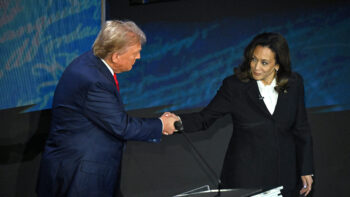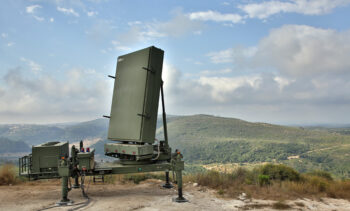Senate Majority Leader Harry Reid recently broke with a decades-long tradition in the Congress. And almost no one noticed.
Congress traditionally has been sensitive to its Constitutional obligation to provide for the common defense. Despite disagreements and rancor on numerous issues, Congress usually cranks out defense appropriations and authorization bills each year.
“Those days are behind us,” Reid declared last month. “We are not going to be gamed by having the military programs funded at a much higher level than Head Start program, or NIH [National Institute of Health]. We’re not going to do that. We’re through.”
Reid’s New Reality
The majority leader’s remark garnered about a nano-second of news coverage. Then Washington turned its attention to, well, everything and anything else—from Obamacare to Obama not caring about Benghazi, from NSA spying to terrorists threats shutting down American embassies.
To be fair to Senator Reid, there were several years when Congress didn’t make funding the armed forces a legislative priority. Take 2011 as a case in point.
The Budget Control Act of 2011 mandated about half of its automatic spending cuts would come from the American military if Congress failed to reach a grand-compromise with the President over balancing the money coming in and the revenue going out. Ignoring the adage “Never take a hostage you are not willing to shoot,” our leaders in Washington knowingly set the stage for accelerating the decline of readiness and military capabilities.
Claims that Congress didn’t know what was coming when it passed the BCA strain credulity. Both lawmakers and the Obama Administration were warned that sequestration would inevitably erode readiness and current capabilities, as well as inhibit acquisition of replacement equipment. The Strategic Choices and Management Review released recently — albeit quite belatedly — by Secretary of Defense Chuck Hagel serves to confirm those common sense predictions.
As Hagel’s review makes clear, readiness and capabilities will suffer in the near-term—even with all the reforms and efficiencies imaginable, and even if Congress okays canceling existing overseas commitments and contracts to buy new equipment, and down-sizing Marine and Army troop levels by the thousands. These and other accounts simply can’t be emptied fast enough to meet the BCA levels mandated for the armed forces budget.
That said, when Congress signed off on the BCA, absent anything as authoritative as Hagel’s BCA report card, members could still hide behind the fiction that funding defense first still mattered. Of course, BCA was a bad deal, but it would force Congress and the president to find a way forward. That fiction no longer holds, but few in Washington seem to care.
Reid’s remarks clearly illustrate that this is a new era. Now, many lawmakers are not only willing to defend the BCA defense spending levels, they are ready to jump the shark and eschew any effort to play the defense card in brokering a budget deal. Defense is just another bill that Washington pays. Harry Reid can now argue that dollars for Head Start—a demonstrably failed program—are just as important as paying the salaries of men and women in uniform–and hardly anyone blinks.
Disaster Politics
Washington’s newfound indifference over defense actually has little to do with defense. Squabbling over the Pentagon’s bottom line is not really about the war, the terrorist threat, the efficiency of military spending or any other issue that usually animates debate over how to handle the armed forces. The military is just collateral damage in a political wrestling match between proponents of limited government and promoters of the welfare state. And when the federal debt is as big as the entire U.S. economy, it’s hard to find common ground when scrapping for dollars.
For his part, Harry Reid is just channeling his commander-in-chief. Mr. Obama was briefed on the results of the Strategic Management and Choices Review. He recognized it gives him no choice at all. But, the White House has already crossed its financial Rubicon, rejecting any fix for defense that comes at the expense of domestic programs.
On the other side of the aisle from Reid, there is not much interest in any deal that bumps up taxes. This Alamo-like attitude does not reflect, as many Washington wags wail, a war within the party over the primacy of defense. There was never uniform consensus among Red State politicians over foreign policy and national security. The reality was—and still remains—that Republicans are willing to fund a strong national defense. Romney had sent plenty of signals he planned to be a Reagan-like foreign policy president, and a clear majority of the party was willing to go along with it. In part, that was because he pledged to tackle what scares the Red States to death: massive spending on big government programs from entitlements to Obamacare that threaten to hamstring the economy.
Absent a president who is even half serious about taking the nanny out of the nanny state, the party of opposition has no good options. They feel like a patient who has been given the choice of whether to die from a brain hemorrhage or a heart attack. No wonder they appear angry, frustrated, and feisty.
The most sensible campaign in the conservative camp fairly reflects the center of gravity of conservatives stand. This push calls for defunding Obamacare to block the unchecked growth of the welfare state; keeping spending at BCA levels to slow the growth of the debt; and fully funding defense with offsetting cuts in wasteful domestic programs—like Head Start. Of course, this solution would not solve all the nation’s fiscal ills, nor would it ensure an adequate national defense over the long term, but it’s a start.
Many pundits, however, say such a bargain will not be struck. If they’re right, then what?
Saved by the Scenario
Even if Congress and the White House muddle through the up-coming fights over fiscal matters—a continuing resolution to funding the government for FY2014 and approval to raise the debt ceiling—these agreements are unlikely to give either side a decisive advantage.
There are only three ways that this state of affairs might change.
The country gets a different president.
Foreign policy and national security are doppelgangers of domestic politics. In domestic affairs, voters vote for leaders who think like they do. If they like Obamacare, they like Obama. If they don’t, they don’t. Defense, for the most part, works the other way around. If voters have trust and confidence in their candidate, they tend to trust them to do the right thing as commander-in-chief. If a new president comes into office with a Reagan-like peace-through-strength program, then by and large his cabinet and the Congress will deliver; it’s just that simple.
Washington is fond of convincing itself what the American people will or won’t stand for when it comes to foreign policy. Mostly Washington is wrong. For example, there’s the common wisdom that Americans won’t fight long, unpopular wars. Really? Okay, put aside “ancient” dust-ups like the American Revolution, the Civil War and the Insurrection in the Philippines and focus solely on the Vietnam War, which is often cited as proof. That war, we are told, became hugely unpopular following the 1968 Tet Offensive. Yet, the U.S. didn’t abandon South Vietnam until seven years later. The fierce opposition to the Vietnam conflict was actually rooted in hatred of the draft. As soon as the draft ended the bottom started to fall out of the anti-war movement.
Iraq and Afghanistan were unpopular, and that was about politics too. As soon as George W. Bush left office, this generation’s anti-war movement virtually vanished from the scene, even though American troops remained engaged. If he chose to, Mr. Obama could have ended his presidency with U.S. troops still in Iraq and Afghanistan. Three Code Pink people might have shown-up at the next president’s inauguration to protest.
Of course Americans don’t like long wars. Other than the Spartans and Attila the Hun, who does? There is a big difference, however, between what polls well and what Americans are willing to support. Popularity and popular will are two very different measures of American commitment. When it comes to foreign policy, what really matters is the willingness of the governed to follow their government–even if they disagree with or dislike how the government elects to provide for the common defense. Presidential policies are not voted off like couples in Dancing with the Stars–unless the Oval Office chooses to make foreign affairs a popularity contest.
Presidents, whether they like to acknowledge it or not, have a deep well of popular will to draw from–if they so chose. For example, when Reagan came into office he had no mandate to fix defense. In fact, many in his cabinet argued the administration ought to reduce the deficit first. Reagan opted for a different course, however, starting his presidency with two rounds of significant increases in defense spending.
Reagan brought the majority of Americans along for the ride because they believed in his domestic politics. They were willing to be led when it came to foreign policy. As former Senator Jim Talent rightly said, “Politicians lose nothing when it comes to defense. Being for it may not get you many votes, but it won’t lose you any either.”
There is also nothing partisan or parochial about being president that favors a strong national defense. John Kennedy was a progressive. He believed in a strong military. The Democratic Party survived the shock just fine.
In contrast, even with all the present fiscal challenges, there was no necessity to throw defense under the bus. It happened because President Obama didn’t have a problem with it. The commander-in-chief just chose not to make the armed forces a top priority. Instead, as he has stated often, his goal is “to a little nation-building right here at home.”
As for the next president, there is really nothing that would constrain him or her from rebuilding a strong American military.
There is one exception to the rule that America outsources its foreign policy concerns to Washington. When moments of crisis arise and Americans become personally fearful for their own safety, they take foreign policy into their own hands and demand action. That doesn’t very often, but when it does, the gloves really come off.
Americans overwhelmingly opposed getting the American military involved in World War II–until the day after Pearl Harbor. Americans were largely indifferent to the outbreak of the Cold War–until the Korean War rekindled fears that a U.S.-Soviet confrontation might bring another world war home to Main Street. After the fall of the Berlin Wall, Americans contentedly watched our military atrophy—until 9/11.
Arguably, Roosevelt could have done even more to prepare the military for World War II. Truman could have followed the defense blueprint laid out in NSC-68 before North Korea invaded the South. George W. Bush could have taken up the defense legacy of Ronald Reagan before the fall of the twin towers. None of them did. They waited for politics to make the call to arms easier.
Whoever is in the White House might similarly wait for such a similar moment.
But even a crisis response is not sustainable without long term political commitment from the top. After the Korean War armistice, Washington could easily have taken another “peace-dividend,” if not for Eisenhower’s eight years of stewardship.
A miracle happens.
When Eisenhower railed against the dangers of the Military-Industrial Complex, defense spending was 50 percent of the federal budget. He realized that even more spending on the government’s big ticket item would crowd out other government programs or require an excessive increase in taxes that would drag down the economy. Even a hawk like Eisenhower recognized there were rational limits. Ike held the line at over-spending — even on defense.
In Ike’s era, entitlement spending was about a fifth of federal spending. Today the proportions are reversed. Defense is less than a fifth of the federal budget. Entitlements are more than half. Unlike, the 1950s, however, the president is not fighting to constrain the growth of the big tickets in the budget.
If defense spending were zeroed out tomorrow and the rest of the budget left unchanged, entitlement spending will consume every dollar of federal revenue within a few decades. The unchecked growth of entitlement spending (which is exempt from BCA limits) is a huge problem—not just for national security programs, but for every other program run by the feds.
A grand bargain on entitlement reform is the only scenario that takes enough pressure off both left and right so that they can agree to sustain adequate long-term defense investments while continue to bicker over the size of government and how to best grow the economy. It is the only long-term option that allows each side to fight another day for their political visions of the future of America.
This is, in fact, the least likely of all three options as long as both the left and the right think there is a chance that they can parley the current political muddle into the Washington trifecta of winning both houses and the White House.
Fear the Future
At the moment, none of these scenarios seems likely. If that holds true, America will have a military in a few years that is as hollow as that we had in the late 1970s. The services will look a lot more like the forces of Desert One or Task Force Smith that failed than the troops that triumphed in Desert Storm.
James Jay Carafano is vice president for foreign and defense policy studies at The Heritage Foundation.
It’s time for a true industrial strategy for American national security
“Industrial policy requires making strategic public investments designed to strengthen economic and national security — not [just in] what is traditionally thought of as the defense industrial base,” write Mara Rudman and Becca Wasser.




























